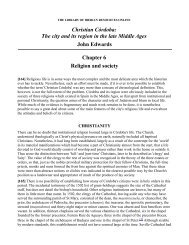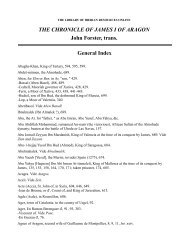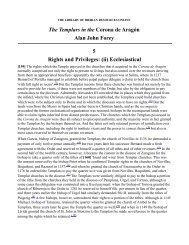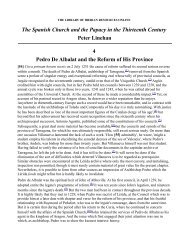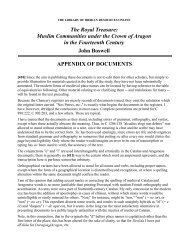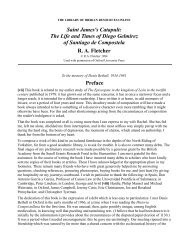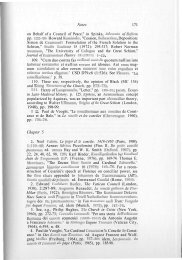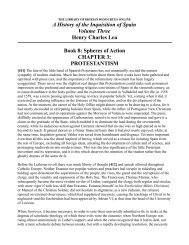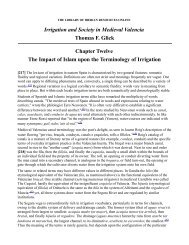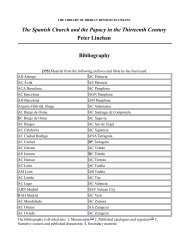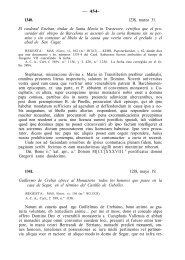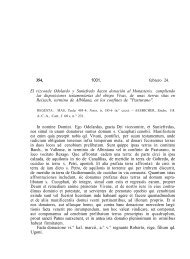Chapter 6 - The Library of Iberian Resources Online
Chapter 6 - The Library of Iberian Resources Online
Chapter 6 - The Library of Iberian Resources Online
You also want an ePaper? Increase the reach of your titles
YUMPU automatically turns print PDFs into web optimized ePapers that Google loves.
women. Some well-born women in the city must have felt that they were regarded seriously as people<br />
only when they engaged in heresy. In this period <strong>of</strong> the Inquisition, heresy literally involved playing<br />
with fire. Facing this danger could reaffirm for many women a sense <strong>of</strong> self that was otherwise<br />
smothered in their sheltered lives. (17)<br />
Folk practitioners posed another challenge to the priests' monopoly on the role <strong>of</strong> intermediary. Some<br />
priests specialized in exorcizing the devil, but the people <strong>of</strong> Seville were as likely to call upon a lay<br />
expert in the occult arts to vanquish the devil by magic. Folk practitioners spoke a more appealing<br />
language than the priests. "<strong>The</strong> Evil Eye," for example, explained a misfortune more clearly than<br />
"God's will," the clergyman's explanation. <strong>The</strong> spells and charms <strong>of</strong> the neighborhood wise woman<br />
appeared more potent and concrete than a priest's plea to a God whose will seemed so capricious. A<br />
saludador (folk faith-healer) who applied his saliva to heal an infected arm performed a specific<br />
physical act, while the priest who prayed over the infected arm [125] seemed only to mutter. (18)<br />
Popular support protected many folk-practitioners from prosecution as sorcerers by the Inquisition.<br />
Underworld people favored folk-practitioners not only for their traditional wisdom, but also because<br />
the occult arts <strong>of</strong>fered so many pr<strong>of</strong>itable opportunities for tricking unsuspecting believers.<br />
Although they were challenged by folk-practitioners, attacked by heretics, and besmirched by<br />
internecine quarrels, monks and priests retained their role as intermediaries in Seville. This suited the<br />
purposes <strong>of</strong> a secular government which relied on these intermediaries to sanctify its rule. Secular<br />
<strong>of</strong>ficials were very much in evidence at the public autos de fé at which the Inquisition subjected some<br />
people to penance and handed others to the secular authorities for execution. (19) On the other hand,<br />
churchmen took a prominent role in the secular public executions. <strong>The</strong> partnership <strong>of</strong> Church and<br />
government bolstered the legitimacy <strong>of</strong> the secular order and assured the continuance <strong>of</strong> the Church as<br />
intermediary.<br />
Another reason why the Church retained this role was that the people <strong>of</strong> the city needed religion as a<br />
verbal and symbolical language. Although the Church was a social, economic, and political institution,<br />
with worldly concerns far removed from matters <strong>of</strong> the spirit, it was also a religious institution. In<br />
Seville during this period the Church was the major interpreter and preserver <strong>of</strong> religious beliefs, for it<br />
had successfully stifled most popular religious groups and all contemporary religious challengers.<br />
Holding a monopoly on religion, it became a depository for the traditional metaphors and imagery by<br />
which people expressed ideas and attitudes about themselves, their city, indeed all <strong>of</strong> life. <strong>The</strong> populace<br />
explained public executions as the consequences <strong>of</strong> sin and believed that their city government was<br />
acting justifiably, as God did when he punished His erring children.<br />
In addition, the rituals <strong>of</strong> the Church were a common language understood by all the people. Religious<br />
rites marked the significant [126] events in an individual's life, and all the community could recognize<br />
his birth, first communion, marriage, and death. Through religious processions and festivals, people <strong>of</strong><br />
the city expressed collective unity, common fears, and aspirations. Everyone could participate in these<br />
familiar rituals, if only as a spectator observing this demonstration <strong>of</strong> community.<br />
Ironically, the very dependence on religion as a language and on priests as spokesmen resulted in a<br />
form <strong>of</strong> anticlericalism that is apparent in underworld vocabulary. Just as common people <strong>of</strong> the city<br />
hated the lawyers and legal language on which they had to depend, they disliked the priestly<br />
intermediaries and religious language. Priests were hated for revealing the impotence and ignorance <strong>of</strong><br />
less educated people, an attitude expressed in the underworld vocabulary that gave the religious title<br />
"bishop" to the cock. (20) Underworld people used the phrase de San Martín el dormido (<strong>of</strong> sleeping<br />
Saint Martin) to describe the crime <strong>of</strong> robbing or killing a sleeping victim. <strong>The</strong> poor box <strong>of</strong> a church<br />
was Juan, and a Juanero was a thief who specialized in robbing poor boxes. Underworld



